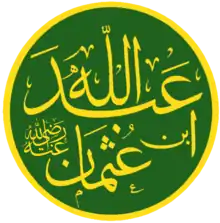Abd Allah ibn Uthman | |
|---|---|
| عبد الله بن عثمان | |
 Calligraphy by Abdallah ibn Uthman, first grandson of the Islamic prophet Muhammad | |
| Born | 620 |
| Died | November 625 (aged 5) |
| Resting place | Jannat al-Baqi, Medina |
| Known for | Being a grandson of the Islamic prophet Muhammad, and son of third Rashidun caliph Uthman |
| Parents |
|
| Relatives | List |
| Family |
|
Abd Allah ibn Uthman (Arabic: عبد الله ابن عثمان, romanized: ʿAbd Allāh ibn ʿUthmān; c. 620 – November 625), was the son of the third caliph Uthman (r. 644–656) and Ruqayya bint Muhammad.[1] Born in Abyssinia, Abd Allah was the first grandson of the Islamic prophet Muhammad.[2]
Biography
By 615 Ruqayya was married to a prominent Muslim, Uthman ibn Affan. She accompanied him on the first Migration to Abyssinia,[3][4][5] where she suffered a miscarriage. They returned to Abyssinia in 616,[6][4][5] and there Ruqayya gave birth to a son, Abdallah in 619.
His parents, Uthman and Ruqayya were among those who returned to Mecca in 619.[7] Uthman emigrated to Medina in 622, and Ruqayya followed him later.[4][5]
Muhammad asked Usama, "Have you ever seen a more handsome couple than those two?" and he agreed that he had not.[8]
Mus'ab al-Zubayri narrated that when Uthman migrated to Abyssinia, he was accompanied by his wife Ruqayya bint Muhammad. A child named Abd Allah was born in the land of Abyssinia in 2 BH.[9]
His mother, Ruqayya fell ill in March 624. Uthman was excused from his military duties in order to nurse her. She died later in the month, on the day when Zayd ibn Haritha returned to Medina with news of their victory at the Battle of Badr.[10][11][5] When his grandfather Muhammad returned to Medina after the battle, the family went to grieve at her grave.
Abd Allah died after a rooster bit his eye in November 625 (Jumada al-Thani 4 AH) at the age of five.[12] Muhammad led his funeral prayers.[13] Abd Allah died in Medina. He was Ruqayya's only child.[4][5]
References
- ↑ Ibn Abd al-Bar (1992). assimilation in knowing friends (in Arabic). Lebanon: house generation. pp. 1839–1843, part 4. Archived from the original on 2019-05-02.
- ↑ Kahn, Tamam (2013-04-02). Untold: A History of the Wives of Prophet Muhammad. Monkfish Book Publishing. ISBN 978-1-939681-05-8.
- ↑ Ibn Ishaq/Guillaume pp. 146, 314.
- 1 2 3 4 Ibn Saad/Bewley p. 25.
- 1 2 3 4 5 Tabari/Landau-Tasseron p. 162.
- ↑ Ibn Ishaq/Guillaume p. 146.
- ↑ Ibn Ishaq/Guillaume p. 168.
- ↑ Jalal al-Din al-Suyuti. Tarikh al-Khulafa. Translated by Jarrett, H. S. (1881). History of the Caliphs, p. 155. Calcutta: The Asiatic Society.
- ↑ Usd al-ghabah fi marifat al-Saḥabah by Ali ibn al-Athir, Volume 2, Pg 571
- ↑ Ibn Ishaq/Guillaume p. 328.
- ↑ Muhammad ibn Umar al-Waqidi. Kitab al-Maghazi. Translated by Faizer, R., Ismail, A., & Tayob, A. K. (2011). The Life of Muhammad, p. 51. Oxford & New York: Routledge.
- ↑ Madelung 1997, p. 384.
- ↑ Kitab Tabaqat Al-Kubra by Ibn Sa'd Volume 2, Part 3, Pg.131
Bibliography
- Madelung, Wilferd (1997). The Succession to Muhammad: A Study of the Early Caliphate. Cambridge University Press. ISBN 978-0-52-164696-3.